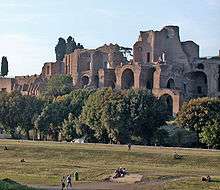Definify.com
Webster 1913 Edition
Palace
Pal′ace
(păl′ā̍s; 48)
, Noun.
[OE.
palais
, F. palais
, fr. L. palatium
, fr. Palatium
, one of the seven hills of Rome, on which Augustus had his residence. Cf. Paladin
.] 1.
The residence of a sovereign, including the lodgings of high officers of state, and rooms for business, as well as halls for ceremony and reception.
Chaucer.
2.
The official residence of a bishop or other distinguished personage.
3.
Loosely, any unusually magnificent or stately house.
Palace car
. See under
– Car
. Palace court
, a court having jurisdiction of personal actions arising within twelve miles of the palace at Whitehall. The court was abolished in 1849.
[Eng.]
Mozley & W.
Webster 1828 Edition
Palace
PAL'ACE
,Noun.
1.
A magnificent house in which an emperor, a king or other distinguished person resides; as an imperial palace; a royal palace; a pontifical palace; a ducal palace.2.
A splendid place of residence; as the sun's bright palace.Definition 2026
Palace
palace
palace
English

Palatine Hill, Domus Augustana (palace of Caesar Augustus)
Noun
palace (plural palaces)
- Official residence of a head of state or other dignitary, especially in a monarchical or imperial governmental system.
- A large and lavishly ornate residence.
- 1963, Margery Allingham, chapter 1, in The China Governess:
- The original family who had begun to build a palace to rival Nonesuch had died out before they had put up little more than the gateway, […].
-
- A large, ornate public building used for entertainment or exhibitions.
Derived terms
Terms derived from palace
Translations
large, lavish residence
|
|
Verb
palace (third-person singular simple present palaces, present participle palacing, simple past and past participle palaced)
- (archaic) To decorate or ornate.
- 1874, Benj. N. Martin, Choice Specimens of American Literature, And Literary Reader:
- May, with her green lap full of sprouting leaves and bright blossoms, her song-birds making the orchards and meadows vocal, and rippling streams and cultivated gardens; June, with full-blown roses and humming-bees, plenteous meadows and wide cornfields, with embattled lines rising thick and green; August, with reddened orchards and heavy-headed harvests of grain, October, with yellow leaves and swart shadows; December, palaced in snow, and idly whistling through his numb fingers;-all have their various charm; and in the rose-bowers of summer, and as we spread our hands before the torches of winter, we say joyfully, "Thou hast made all things beautiful in their time."